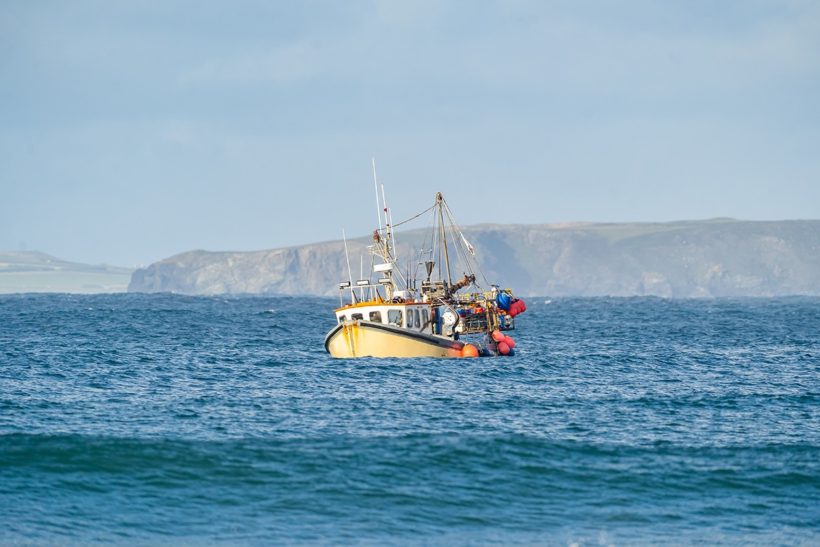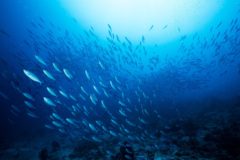More licences issued – but France wants 100 extra
French fishermen were threatening further blockades of Channel ports in the run-up to Christmas if more licence applications to fish in UK and Jersey waters are not granted, reports Tim Oliver.
This was despite the UK and Jersey issuing more licences last week after intensive technical discussions between the UK, France and the Commission, and a meeting between Defra secretary George Eustice and European fisheries commissioner Virginijus Sinkevicius.
French officials and fishermen say they are waiting for Britain to approve around 100 more licences.
The Hauts-de-France regional committee of the French national fisheries committee CNPMEM said fishermen would blockade Calais during the run-up to Christmas.
“We have made it clear – protests are planned, following on from the blockade of Breton and Norman ports that took place on 26 November,” said Olivier Leprêtre, head of the regional fisheries committee.
“Actions will target the import of British products. French fishermen are more than ever united against adversity, and don’t intend to take it lying down, faced with so much bad faith.”
The French minister for the sea Annick Girardin said she would conduct a review of all of the failed licence applications, and that the government would help those fishermen who had not been successful.
One of the difficulties has been issuing licences for vessels that are replacing boats which have been able to show evidence of fishing in UK and Jersey waters in the reference period, but do not themselves have a track record, and may be bigger or more powerful than the vessels they are replacing.
Updated figures issued in a written ministerial statement from Defra last week showed that as of 15 December, France had applied for 88 licences for over-12m vessels to fish in the UK six-12nm zone, and 87 had been approved. For under-12m vessels, 50 applications had been received and 20 approved.
For direct replacement vessels, France had applied for 43 licences and 26 had been approved.
Also as of 15 December, Jersey had received 217 applications for licences to fish in its waters, and had issued 130 full licences. This is more than double the 60 Jersey vessels routinely operating in their own waters.
Thirty-three temporary licences valid until 31 January, 2022 have also been issued by Jersey, but the Commission/France must produce further information if they are to become full licences. Fifty-four licences had lapsed on 30 October due to lack of evidence.
Jersey had also received 11 applications for replacement vessels which are pending until the methodology for assessing the applications is finalised.
Guernsey has approved 40 licences out of 58 applications. Three of the approved licences will be issued to replacement vessels in due course. Transitional arrangements allow 167 French vessels, including those that have been issued with a full licence, to continue fishing on a temporary basis until 31 January, 2022.
“This now concludes this phase of intensive talks on licensing,” said the Defra spokesperson.
“Throughout this process, the UK’s approach has been evidence-based and in line with our commitments under the Trade and Co-operation agreement (TCA).
“We have licensed vessels where sufficient evidence has been provided that demonstrates that a vessel qualifies for access under the TCA. Where that evidence has not been provided, licences have not been issued.
“On direct replacement vessels, we have taken an approach in line with the TCA which provides stability and ensures the sustainability of our fisheries.”
The MMO will publish the government’s approach to licensing replacement vessels. Defra said the process was technical and ‘based on evidence rather than deadlines’. Despite the EU setting a 10 December deadline, further discussions on replacement vessels were continuing last week.
Defra said the UK and the crown dependencies have ‘gone to great lengths’ to help vessels prove their status throughout the process – for example, they had purchased commercially available electronic positioning data.
“We have also shown particular flexibility for smaller (under-12m) vessels applying to fish in the UK 6-12nm,” said Defra.
“We didn’t receive these applications until June. For these vessels, we have only required electronic positional data for two years of the reference period, given this only became a legal requirement for these vessels in 2015, supplemented by other positional data for the remaining years if electronic positional data is not available (plus corresponding catch data).”
Defra pointed out that the Commission has already accepted that not all applications were valid, and had admitted that the evidence for 17 EU vessels was ‘poor’.
“Jersey has also received a large amount of data that was contradictory, and showed vessels fishing outside of its waters and/ or in years outside the reference period, which took time to sort through and assess.”
Jersey’s minister for the environment Deputy John Young said 130 permanent licences had been issued to French vessels and ‘the technical exercise can be brought to a conclusion’. He added that it was also important that Jersey’s seven applications to fish in EU waters were determined.
“We can now begin the important work of progressing the nature and extent of fishing in our waters as set out in the TCA, including by these vessels: confirming what species fishermen are permitted to catch, the period they can do so, and the measures required to conserve our fish stocks,” he said.
External relations minister Senator Ian Gorst said the technical process had been ‘intensive’, requiring ‘close diplomatic co-operation’ between Jersey, the UK and the Commission.
The Commission said a number of vessels had still not yet received a licence. It would continue to work with France ‘to ensure full implementation of the TCA, and will examine the legal circumstances around every requested licence which has not been granted’.
Defra added that as of 15 December, the UK had received an overall 1,669 applications for EU vessels to fish in the UK 12-200nm zone, and all 1,669 had been approved. The great majority of these were to France, with 736, followed by 355 for the Republic of Ireland and 194 to the Netherlands.
This story was taken from the latest issue of Fishing News. For more up-to-date and in-depth reports on the UK and Irish commercial fishing sector, subscribe to Fishing News here or buy the latest single issue for just £3.30 here.






